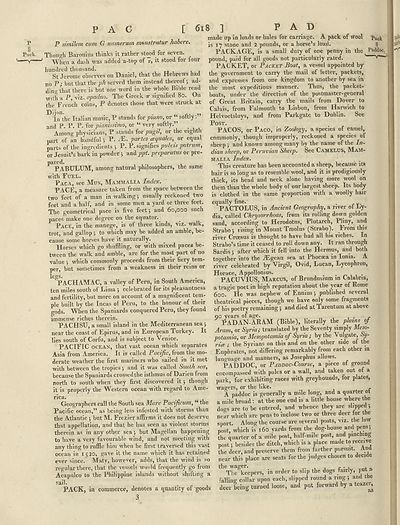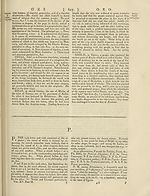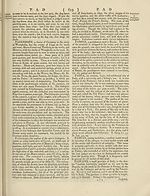Encyclopaedia Britannica > Volume 15, NIC-PAR
(694) Page 618 - PAC
Download files
Complete book:
Individual page:
Thumbnail gallery: Grid view | List view

PAG
[ 618 ]
PAD
Pack.
P similem cum G namerum mmstratur habere.
Pack
Though Baronins thinks it rather stood for seven.
When a dash was added a-top of p, it stood for four
hundred thousand. , TT , e j
St Jerome observes on Daniel, that the Hebrews had
no P; but that the ph served them instead thereof; ad¬
ding that there is but one word in the whole Bible read
with a P, viz. apadno. The Greek signified 80. On
the French coins, P denotes those that were struck at
Jn the Italian music, P stands for piano, or “ softly:”
and P. P. P- for pianissimo, or “ very softly.”
Among physicians, P stands for pugi/, or the eighth
part of an handful P.-/E. partes cequales, or equal
parts of the ingredients •, P. P. signifies palvis pati um,
or Jesuit’s bark in powder; and ppt. preparatus or pre¬
pared.
PABULUM, among natural philosophers, the same
with Fuel.
Paca, see Mus, Mammalia Index.
PACE, a measure taken from the space between the
two feet of a man in walking j usually reckoned two
feet and a half, and in some men a yard or three feet.
The geometrical pace is five feet} and 60,000 such
paces make one degree on the equator.
Pace, in the manege, is of three kinds, viz. walk,
trot, and gallop} to which may he added an amble, be¬
cause some horses have it naturally.
Horses which go shuffling, or with mixed paces be¬
tween the walk and amble, are for the most part of no
value } which commonly proceeds from their fiery tem¬
per, but sometimes from a weakness in their reins or
legs.
PACHAMAC, a valley of Peru, in South America,
ten miles south of Lima } celebrated for its pleasantness
and fertility, but more on account of a magnificent tem¬
ple built by the Incas of Peru, to the honour of their
gods. When the Spaniards conquered Peru, they found
immense riches therein.
PAC HSU, a small island in the Mediterranean sea }
near the coast of Epirus, and in European Turkey. It
lies south of Corfu, and is subject to Venice.
PACIFIC ocean, that vast ocean which separates
Asia from America. It is called Pacific, from the mo¬
derate weather the first mariners who sailed in it met
with between the tropics} and it was called South sea,
because the Spaniards crossedthe isthmus of Darien from
north to south when they first discovered it } though
it is properly the Western ocean with regard to Ame¬
rica.
Geographers call the South sea Mare Pacificum, u the
Pacific ocean,” as being less infested with storms than
the Atlantic •, but M. Frezier affirms it does not deserve
that appellation, and that he has seen as violent storms
therein as in any other sea •, but Magellan happening
to have a very favourable wind, and not meeting with
any thing to ruffle him when he first traversed this vast
ocean in I 5 20, gave it the name which it has retained
ever since. Maty, however, adds, that the wind is so
regular there, that the vessels would frequently go from
Acapulco to the Philippine islands without shifting a
sail.
PACK, in commerce, denotes a quantity of goods
3
made up in loads or bales for carriage. A pack of wool
is 17 stone and 2 pounds, or a horse’s load. I|
PACKAGE, is a small duty of one penny in the t Paddoc.
pound, paid for all goods not particularly rated. y ^
PACKET, or Packet Boat, a vessel appointed by
the government to carry the mail of letter, packets,
and expresses from one kingdom to another by sea in
the most expeditious manner. Thus, the packet-
boats, under the direction of the postmaster-geueral
of Great Britain, carry the mails from Dover to
Calais, from Falmouth to Lisbon, from Harwich to
Helvoetsluys, and from Parkgate to Dublin. See
Post.
PACOS, or Paco, in Zoology, a species of camel,
commonly, though improperly, reckoned a species of
sheep } and known among many by the name of the /«-
dian sheep, or Peruvian Sheep. See Camelus, Mam¬
malia hidex.
This creature has been accounted a sheep, because its
hair is so long as to resemble wool, and it is prodigiously
thick, its head and neck alone having more wool on
them than the whole body of our largest sheep. Its body
is clothed in the same proportion with a woolly hair
equally fine.
PACTOLUS, in Ancient Geography, a river of Ly¬
dia, called Chrysorrhoas, from its rolling down golden
sand, according to Herodotus, Plutarch, Pliny, and
Strabo } rising in Mount ’Imolus (Strabo), from this
river Croesus is thought to have had all his riches. In
Strabo’s time it ceased to roll down any. It ran through
Sardis •, after which it fell into the Hermus, and both
together into the jEgean sea at Phocsea in Ionia. A
river celebrated by Virgil, Ovid, Lucan, Lycophron,
Horace, Appollonius. ^ .
PACUVIUS, Marcus, of Brundusium in Calabria,
a tragic poet in high reputation about the year of Rome
600. He was nephew of Ennius} published several
theatrical pieces, though we have only some fragments
of his poetry remaining} and died at Tarentum at above
00 years of age. , . r
PAD AN-ARAM (Bible), literally the plains of
Aram, or Syria; translated by the Seventy simply Meso¬
potamia, or Mesopotamia of Syria ; by the Vulgate, Sy-
rice ; the Syrians on this and on the other side of the
Euphrates, not differing remarkably from each other m
language and manners, as Josephus allows.
PADDOC, or PADVOC-Course, a piece of ground
encompassed with pales or a wall, and taken out of a
park, for exhibiting races with greyhounds, for plates,
wagers, or the like. -
A paddoc is generally a mile long, and a quarter ot
a mile broad : at the one end is a little house where the
dogs are to be entered, and whence they are slipped}
near which are pens to inclose two or three deer for the
sport. Along the course are several posts, viz. the low
post, which is 160 vards from the dog-house and pens}
the quarter of a mile post, half-mile post, and pinching
post} besides the ditch, which is a place made to receive
the deer, and preserve them from farther pursuit. And
near this place are seats for the judges chosen to decide
Tbe^keepers, in order to slip the dogs fairly, put &
falling collar upon each, slipped round a ring • the
deer being turned loose,
and put forward by a teazer,
as
[ 618 ]
PAD
Pack.
P similem cum G namerum mmstratur habere.
Pack
Though Baronins thinks it rather stood for seven.
When a dash was added a-top of p, it stood for four
hundred thousand. , TT , e j
St Jerome observes on Daniel, that the Hebrews had
no P; but that the ph served them instead thereof; ad¬
ding that there is but one word in the whole Bible read
with a P, viz. apadno. The Greek signified 80. On
the French coins, P denotes those that were struck at
Jn the Italian music, P stands for piano, or “ softly:”
and P. P. P- for pianissimo, or “ very softly.”
Among physicians, P stands for pugi/, or the eighth
part of an handful P.-/E. partes cequales, or equal
parts of the ingredients •, P. P. signifies palvis pati um,
or Jesuit’s bark in powder; and ppt. preparatus or pre¬
pared.
PABULUM, among natural philosophers, the same
with Fuel.
Paca, see Mus, Mammalia Index.
PACE, a measure taken from the space between the
two feet of a man in walking j usually reckoned two
feet and a half, and in some men a yard or three feet.
The geometrical pace is five feet} and 60,000 such
paces make one degree on the equator.
Pace, in the manege, is of three kinds, viz. walk,
trot, and gallop} to which may he added an amble, be¬
cause some horses have it naturally.
Horses which go shuffling, or with mixed paces be¬
tween the walk and amble, are for the most part of no
value } which commonly proceeds from their fiery tem¬
per, but sometimes from a weakness in their reins or
legs.
PACHAMAC, a valley of Peru, in South America,
ten miles south of Lima } celebrated for its pleasantness
and fertility, but more on account of a magnificent tem¬
ple built by the Incas of Peru, to the honour of their
gods. When the Spaniards conquered Peru, they found
immense riches therein.
PAC HSU, a small island in the Mediterranean sea }
near the coast of Epirus, and in European Turkey. It
lies south of Corfu, and is subject to Venice.
PACIFIC ocean, that vast ocean which separates
Asia from America. It is called Pacific, from the mo¬
derate weather the first mariners who sailed in it met
with between the tropics} and it was called South sea,
because the Spaniards crossedthe isthmus of Darien from
north to south when they first discovered it } though
it is properly the Western ocean with regard to Ame¬
rica.
Geographers call the South sea Mare Pacificum, u the
Pacific ocean,” as being less infested with storms than
the Atlantic •, but M. Frezier affirms it does not deserve
that appellation, and that he has seen as violent storms
therein as in any other sea •, but Magellan happening
to have a very favourable wind, and not meeting with
any thing to ruffle him when he first traversed this vast
ocean in I 5 20, gave it the name which it has retained
ever since. Maty, however, adds, that the wind is so
regular there, that the vessels would frequently go from
Acapulco to the Philippine islands without shifting a
sail.
PACK, in commerce, denotes a quantity of goods
3
made up in loads or bales for carriage. A pack of wool
is 17 stone and 2 pounds, or a horse’s load. I|
PACKAGE, is a small duty of one penny in the t Paddoc.
pound, paid for all goods not particularly rated. y ^
PACKET, or Packet Boat, a vessel appointed by
the government to carry the mail of letter, packets,
and expresses from one kingdom to another by sea in
the most expeditious manner. Thus, the packet-
boats, under the direction of the postmaster-geueral
of Great Britain, carry the mails from Dover to
Calais, from Falmouth to Lisbon, from Harwich to
Helvoetsluys, and from Parkgate to Dublin. See
Post.
PACOS, or Paco, in Zoology, a species of camel,
commonly, though improperly, reckoned a species of
sheep } and known among many by the name of the /«-
dian sheep, or Peruvian Sheep. See Camelus, Mam¬
malia hidex.
This creature has been accounted a sheep, because its
hair is so long as to resemble wool, and it is prodigiously
thick, its head and neck alone having more wool on
them than the whole body of our largest sheep. Its body
is clothed in the same proportion with a woolly hair
equally fine.
PACTOLUS, in Ancient Geography, a river of Ly¬
dia, called Chrysorrhoas, from its rolling down golden
sand, according to Herodotus, Plutarch, Pliny, and
Strabo } rising in Mount ’Imolus (Strabo), from this
river Croesus is thought to have had all his riches. In
Strabo’s time it ceased to roll down any. It ran through
Sardis •, after which it fell into the Hermus, and both
together into the jEgean sea at Phocsea in Ionia. A
river celebrated by Virgil, Ovid, Lucan, Lycophron,
Horace, Appollonius. ^ .
PACUVIUS, Marcus, of Brundusium in Calabria,
a tragic poet in high reputation about the year of Rome
600. He was nephew of Ennius} published several
theatrical pieces, though we have only some fragments
of his poetry remaining} and died at Tarentum at above
00 years of age. , . r
PAD AN-ARAM (Bible), literally the plains of
Aram, or Syria; translated by the Seventy simply Meso¬
potamia, or Mesopotamia of Syria ; by the Vulgate, Sy-
rice ; the Syrians on this and on the other side of the
Euphrates, not differing remarkably from each other m
language and manners, as Josephus allows.
PADDOC, or PADVOC-Course, a piece of ground
encompassed with pales or a wall, and taken out of a
park, for exhibiting races with greyhounds, for plates,
wagers, or the like. -
A paddoc is generally a mile long, and a quarter ot
a mile broad : at the one end is a little house where the
dogs are to be entered, and whence they are slipped}
near which are pens to inclose two or three deer for the
sport. Along the course are several posts, viz. the low
post, which is 160 vards from the dog-house and pens}
the quarter of a mile post, half-mile post, and pinching
post} besides the ditch, which is a place made to receive
the deer, and preserve them from farther pursuit. And
near this place are seats for the judges chosen to decide
Tbe^keepers, in order to slip the dogs fairly, put &
falling collar upon each, slipped round a ring • the
deer being turned loose,
and put forward by a teazer,
as
Set display mode to:
![]() Universal Viewer |
Universal Viewer | ![]() Mirador |
Large image | Transcription
Mirador |
Large image | Transcription
Images and transcriptions on this page, including medium image downloads, may be used under the Creative Commons Attribution 4.0 International Licence unless otherwise stated. ![]()
| Encyclopaedia Britannica > Encyclopaedia Britannica > Volume 15, NIC-PAR > (694) Page 618 - PAC |
|---|
| Permanent URL | https://digital.nls.uk/192590720 |
|---|
| Attribution and copyright: |
|
|---|
| Shelfmark | EB.11 |
|---|---|
| Description | Ten editions of 'Encyclopaedia Britannica', issued from 1768-1903, in 231 volumes. Originally issued in 100 weekly parts (3 volumes) between 1768 and 1771 by publishers: Colin Macfarquhar and Andrew Bell (Edinburgh); editor: William Smellie: engraver: Andrew Bell. Expanded editions in the 19th century featured more volumes and contributions from leading experts in their fields. Managed and published in Edinburgh up to the 9th edition (25 volumes, from 1875-1889); the 10th edition (1902-1903) re-issued the 9th edition, with 11 supplementary volumes. |
|---|---|
| Additional NLS resources: |
|

